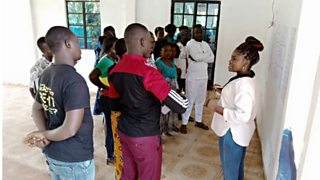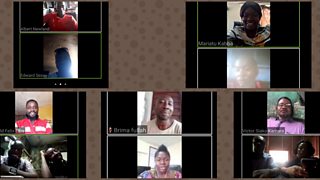How coronavirus changed media training in Sierra Leone - for good
Mariatu Kabba and Victor Kamara
Journalism mentors, Βι¶ΉΤΌΕΔ Media Action Sierra Leone
Tagged with:
People all over the world are having to adapt their ways of working in the COVID-19 pandemic, and we in Sierra Leone are no exception. But working amid limited internet connectivity and inconsistent power supply makes that adaptation even more challenging.
In a way, we were lucky - as one of the last countries in the world to be hit by the novel coronavirus, COVID-19. Still, when the first cases emerged and regional travel restrictions came into force, this came as quite an adjustment to our usual ways of working.
We’d been preparing a new training course for our radio partners on communicating in health emergencies. Βι¶ΉΤΌΕΔ Media Action runs regular to help partners to engage with, connect and inform their audiences on health issues, should a crisis arise.

We usually run regular training sessions on communicating in health emergencies face-to-face
Suddenly, we were faced with having to deliver the whole course remotely – during a pandemic - when it mattered more than ever. Βι¶ΉΤΌΕΔ Media Action has vast experience in Sierra Leone of training local journalists during the Ebola epidemic of 2014-15 – but that was delivered face-to-face. We’d never done anything like this via phone and internet connection – and neither had our partners.
It was daunting to say the least. Data coverage is improving but is far from perfect in Sierra Leone, particularly in more remote and rural areas. And with regular power cuts across the country, keeping mobile phones fully charged can be harder than in other parts of the world, but we all did our best.
As most stations don’t have fixed internet, we provided all participants with mobile phone data instead. Three platforms seemed the most appropriate to deliver the training: Zoom, WhatsApp and regular phone calls. But of course, there were challenges.
Turning on videos at least to say “hi” and see everyone’s faces definitely helped to build a sense of togetherness for the Zoom sessions. Often, we had to switch to audio-only after that, to accommodate the slow connection speed. But the training was still lively, vibrant and collaborative.
When there were serious connection challenges – and there were several! – we made phone calls to complete the training modules. Flexibility and creativity were key to finding solutions for each group – but the general experience gave both us and our participants ideas for the future.

We sent audio exercises, video demos and documents – all via WhatsApp, for participants to watch, listen or read ahead of time of the sessions on Zoom.
"I can’t say that its effectiveness surpasses our usual one-on-one meetings before the epidemic, but I strongly believe it’s a unique alternative for future production meetings and training sessions," said participant Kadiatu Tholley.
Kadiatu joined us from Advocacy Radio in Port Loko, one of the 31 different stations we ran the course with over an intense three-week period. At times it was challenging, but it was very rewarding. We know our partner stations are communicating better during COVID-19 right now, sharing content to protect vulnerable groups, so that audiences can better cope and adapt to protect themselves and their families. The role media plays in health emergencies is vital.
Now we’re drawing on what we’ve learned to help adapt other critical Βι¶ΉΤΌΕΔ Media Action projects. Our project called ‘EAGER’ (Every Adolescent Girl Empowered and Resilient) aims for out-of-school adolescent girls to have significantly improved learning outcomes and have transitioned to education, training or employment. We support 18 partner stations across the country to produce their own local radio shows. With travel restrictions likely to continue for some time, our usual model of travelling between stations will remain on hold. But now we have learnt – and shown the stations – that remote support and co-production is not only possible, it even has benefits.
Even once travel restrictions are lifted, some of these new methods will remain – because we found that remote mentoring works. We certainly won’t stop all travel, but we will reconsider how much time we spend in the field – to develop schedules that are time-effective, cost-effective, and effective in their learning outcomes too.
The beauty of discovering this way of working is that it will allow Βι¶ΉΤΌΕΔ Media Action to support more stations, more often. And by helping partners create more effective programmes, we’ll be better able to engage and empower audiences on vital development issues – even after the pandemic is over.
Mariatu and Victor are Journalism mentors for Βι¶ΉΤΌΕΔ Media Action in Sierra Leone
--
‘EAGER’ (Every Adolescent Girl Empowered and Resilient) is funded by UK AID from the UK Government – learn more here
Βι¶ΉΤΌΕΔ Media Action delivers Lifeline programming in many countries around the world, you can learn more about this .
Our COVID-19 handbook for media is available and our guide for media on communicating in health emergencies is available in 13 languages .
